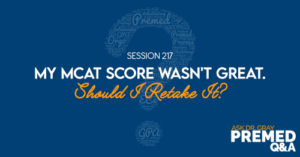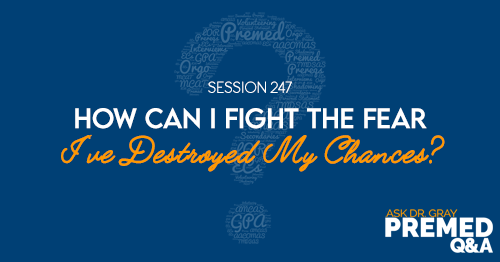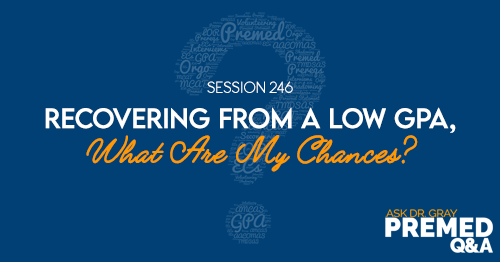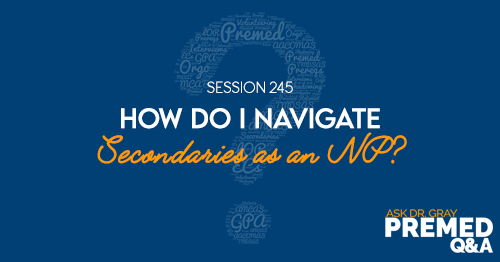Apple Podcasts | Google Podcasts
Session 217
This student is thinking if he should retake his MCAT or just proceed with his application with a GPA of 3.5 and an MCAT score of 500. He is seeking guidance on the best things he should do as he continues his path to the field of medicine.
Ask Dr. Gray: Premed Q&A is brought to you by Blueprint MCAT. Listen to this podcast episode with the player above, or keep reading for the highlights and takeaway points.
The episodes in this podcast are recordings of our Facebook Live that we do at 3 pm Eastern on most weekdays. Check out our Facebook page and like the page to be notified. Also, listen to our other podcasts on MedEd Media. If you have any questions, call me at 617-410-6747.
[00:24] Question of the Day
Q: “I’m currently in the cycle and secondaries have been coming in. My GPA and MCAT are on the stronger side. I have a 3.5 GPA and it was upwards. But then, it weighed down. I took the MCAT on May 14 and thought I was doing pretty good. But once I submitted, got a score back, it was around 500 so it wasn’t what I wanted.
For some schools, I look at the MSAR and their range is 500. So maybe there are possibilities there. But honestly, I’m thinking, I should probably just retake this exam. But at the same time, I already spent all this money. For the schools that I have a slight chance with, I might as well just apply with them. So I want to continue to have guidance on what the best things to do.”
A: Step one, ignore what the MSAR says because the MCAT and GPA data on the MSAR scare everyone. Not everyone can get a 518. It’s something like the 95th percentile. When you look at that data, it doesn’t give you a full picture of what medical schools are actually doing. It gives you a very skewed perspective.
Remember that data on the MCAT and GPA are median numbers. This means that half the class is below that number, and half the class is above it. You look at the 25th and the 10th percentile number and 10% of the class is still below that number. And medical schools are accepting those people.
Diversity in Med School
There are people who have a 500 MCAT, a 3.5 GPA, and something else in their application that make the schools want to have them in their class. There are schools that are looking for diversity. They are not judging you based on everyone, they are judging you as you. They are looking at all of you in context.
Med Schools Have the Data
Med schools will decide whether you are good enough to do well in their school. Every school knows these numbers. Historically, they know that students, those they have accepted who get above a 496 are doing just fine in their school. They may not have the best grades or the best Step 1 score but have passed. They still pass and they do well enough.
Each school has the data showing if students do well enough which will result in their acceptance to the med school. That is where cutoffs come from. Typically, schools internally have their own cutoffs.
For example, every student that they accept below 496 fail Step 1 at least one time. Every student that they accept with a GPA below a three-point something or a two-point something, regardless of upward trends, fails at least one class during their first year.
Schools have this data. They look at it and that is how they make their decisions.
Applying with a 3.5 GPA and 500 MCAT
For you, having a 3.5 GPA is good and not a reason to be concerned. A 500 MCAT score is on average. Although the average now is a little bit higher, 500 is typically good enough.
Don’t worry about your stats. You can apply, in the context of having diversity as well for medical schools. It’s just what it is, you play the cards that you’re dealt.
“Apply and do everything else – clinical experience, shadowing, all these other things.” Click To TweetShow that you are a good person, just like anyone else should be doing in an application. Let the medical schools tell you if that’s not good enough, regardless of who you are.
[05:42] Overthinking
Q: “My theme/story on the way I got into medicine was through teaching and tutoring. That’s where I find the most fulfillment. At the back of my mind, I was thinking if I don’t have the up stats and I want to be a teacher but don’t have a 4.0 GPA or something like that. I don’t know if that’s just me overthinking things.”
A: Think of athletics, some of the best coaches are not the most athletic people. You don’t have to be smart, like having the best grades, in order to teach. And then, they can turn around and teach those other people.
“Some of the best teachers are actually the ones that struggle in school because they have to work really hard to figure out concepts that work for them.” Click To TweetDon’t worry about what they are going to think about your grades or if you are a teacher. You’re applying to medical school so they don’t really care about your teaching although it would be interesting to them.
You are a very typical premed student, overthinking the ways that they are not going to like you. Flip it into how awesome you are as a person, that they’re going to love this or that about you.
[07:29] DO versus MD Schools
Q: “I was planning to apply for DO. But I have tons of videos and watching DO versus MD and I get similar things. I remember I watched your video about DO versus MD. Obviously, I didn’t know what specialty I wanted to go into. But sometimes, when I look at videos, they’re saying as you go the DO route, you’re going to be very limited in what you can do. I want to be a primary care physician. Right now, I’m not really decided yet.”
A: DO equals MD. I get lots of other influencers saying these are different. There is still a stigma out there typically, in more competitive specialties and at more competitive programs.
If your goal is to go to the northeast and do your residency training at Harvard as an ophthalmologist, there may be some bias there against DOs. If you want to be an ophthalmologist and you’re okay going to a midwestern, smaller residency program that trains outstanding ophthalmologists, they may accept you as a DO.
There are DO ophthalmologists out there, DO radiologists, and DO orthopedic surgeons. Every single DO competitive specialty is out there.
“It's not the degree, it's the person.”Click To Tweet[09:17] Different Systems of Learning and Curriculum
Q: “How well versed should you be on different curricula for med school like problem-based learning or traditional lecture style and what is the consensus on the best one to go to?”
A: There isn’t one. It’s about whatever works for you. Whether it’s problem-based learning, flipped classrooms, or any of the different styles, you really have to do some self-reflection and think where you will fit best. A lot of students just go wherever and to whoever would accept them.
“You can do that work upfront and apply to schools that you think are going to help you thrive as a medical student.”Click To TweetWhen you get there you know and you understand that you will be successful in all of the schools that are going to accept you because you have already put in the work.
Success in Schools Regardless of Curriculum Type
There may be schools that have different curricula. You know you can be successful there even though it has a traditional curriculum because of XYZ reasons. And you can be successful at that school with PBL systems-based curriculum, because of certain reasons.
“You just have to figure out what you think is best for you; figure out and understand and ask questions.” Click To TweetTry to find students at each of the schools. Ask them about the different curriculum styles and what they like and don’t about it. Try to integrate that into who you are as a person as well.
[11:10] Secondary Application
Q: “For the secondary application, one question that I’m pretty sure would come up in some schools’ applications is how the height of COVID-19 impacted you.
Just a little personal background, I went to a predominantly white institution, a Christian institution. Those are pretty small so I was not really necessarily isolated the whole time there but I was definitely the only minority in my science classes.
Obviously, that started to feel a little bit even more isolated. I was in a bad place. But I don’t want to say that my mental health was so bad at that time. I don’t know how to change that to give medical schools the impression that something was wrong with me if that makes sense. I got a C in an ecology class and that was the lowest grade during that and after the pandemic. ”
A: That makes complete sense. Lots of people had worse grades during the pandemic. You won’t need to worry about that.
You should tell your story and focus on being isolated and lonely and what you did to handle that. If you didn’t fail out of classes and need to take semesters off, don’t worry too much about it. Tell your truth and it will come through.
“It's not just the fact that you were battling some depression there or whatever it is that you were going through... What did you do to counteract that? How did you grow through that?”Click To Tweet[14:09] Path to Medicine
This student says, “In high school, being on a football team, everyone thinks you want to go to college to play football but I took an anatomy physiology course and my teacher made the class so fun and interesting like one of the classes in high school which I was so invested in. I wanted to pursue that more so I switched my major from engineering to biology.
Over time, I just love learning about science. I was able to get a tutoring job for my school at the coaching center. Through that, I met other premed students and they started to rouse as I was teaching them. I just had fulfillment in teaching. Because I want to know more about what doctors do on a day to day, that’s when I started to shadow academic physicians.”
Connecting the Dots to Medicine
One story that connects the dots to medicine is what he wrote in his personal statement. His sister got sick with pneumonia. She had to take antibiotics. She hates taking pills and he was telling her what he learned in class about finishing antibiotics.
He loves to educate people to take action and navigate through life by giving them the most options. By doing so, they can take control of their life and take initiative in their care. This gives him purpose and fulfillment.
He had multiple experiences like these within his home and on his team with his football teammates. If they got injured, he tries to think about what they were doing in anatomy class to help them. Those are the stories you need to bring up when discussing why you want to be a doctor. That’s what really connects the dots.
Parents’ Influence in the Health Field
His dad is a pharmacist. He is not what we consider a doctor MD/DO but he works in the health field and helps patients in medical situations. His mom is an attorney who practices personal injury and immigration, and there is a lot of medical stuff that she would also talk about. These are some of the connections to the health field that you need to include in your application.
Academic Medicine
One of the secondary applications for school has two boxes where you can choose two things out of a list of interests you want to do. One of them was academic medicine. This is something he thinks he might like to test after he graduates from medical school.
Links:
Medical School HQ Facebook page
Medical School HQ YouTube channel
Instagram @MedicalSchoolHQ
Join the Application Academy!
The Premed Playbook: Guide to the Medical School Personal Statement
The Premed Playbook: Guide to the Medical School Application Process
SEARCH SITE
LISTEN FOR FREE












